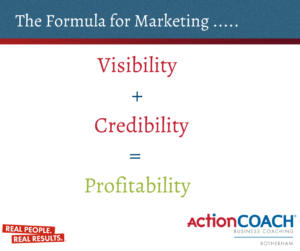MARKETING YOUR BUSINESS
The Problem
Let me tell you a common story for business owners.
Bill was having a problem. His business wasn’t growing and his income was flat.
He called me up one day, asking for help. During our conversation, he asked, “What’s the difference between marketing and selling?”
“Marketing is what you do to keep your name in front of your customer. Selling is what you do when you’re trying to get your customer to buy something from you. Why do you ask?” I replied.
“Well… It seems to me that I do okay in selling, but I’m terrible when it comes to marketing.” Bill said. He continued. “I do a pretty good job of closing sales when I get in front of a customer, but getting in front of a customer is the hard part. And I do a terrible job of keeping my name in front of my customers and prospects.
“Because I’m so disorganised, by the time I get around to calling them to see how they’re doing, they don’t even remember who I am. Or maybe it just seems that way. Either way, I’m not getting any business.”
The Formula for Successful Marketing:
Visibility + Credibility = Profitability
Visibility – Make sure your customers know about you and what you are offering; in other words, be seen, otherwise it’s often out of sight, out of mind. You want them to say, ” I see you everywhere!” Make yourself ubiquitous!
Credibility – How believable and trustworthy are you? You can communicate credibility by including ratings, reviews and testimonials on your website, newsletter or social media. Offer value to your prospects with free resources they need, i.e a lead magnet.
Profitability – Cultivating relationships that allow the right customers to come to you.

A Typical Problem
Bill’s problem is typical of most of the salespeople and business owners I work with. Every salesperson I’ve met says “When I can get in front of a prospect, I can close the sale… [most of the time]. But I’m not able to get in front of enough prospects.”
What do they do? They go out and spend a lot of money on advertising which does nothing more than lighten their bank account. They don’t realise there is a difference between marketing, advertising and selling.
Marketing and advertising aren’t the same. You place advertisements in newspapers, magazines, and trade journals, and on radio and television. They’re often very expensive and aren’t always targeted.
Yes, you’re getting your name out there, and placing it in front of many people – or so says the person who sold you the ad – but the majority of people who are supposed to be seeing your ad aren’t the people who would be interested in buying your product or service.
Which newspapers and magazines do you read? How much attention do you pay to the advertising? If you’re like most folks, you flip through the pages as you look for the next article or story you want to read.
What do you do when you’re in the car listening to the radio and a commercial comes on? You push the button and search for another station that’s playing music or talking about something interesting.
And let’s not forget television. When does your remote control get the most use? When a commercial comes on.
Marketing Makes You Money
Marketing, on the other hand, is designed to keep your name in front of a targeted list of prospects. A well-conceived and executed marketing campaign can bring you huge results.
It is a much more effective – and cost-efficient- way of staying in touch with your prospects and customers.
To become a good marketer, you must have a good database, i.e. a list of people – prospects and/or customers – that you’re going to keep in touch with.
Products like Hubspot, KARTRA, Outlook and other CRM software are excellent database tools.
Most businesses- and salespeople – like Bill – do a poor job of keeping their name in front of their customers.
They get around to calling on the phone every few weeks or is it months, at best. And see their customers face-to-face less frequently.
If you’ve got a database of 1000 people, and want to keep in touch with everybody once a month, that’s a thousand people you’re trying to contact. If you’re going to keep in touch every other month, that’s 500 people.
Good luck! Opportunities are going to slip through the cracks.
- Without an effective marketing campaign, your customers don’t hear from you.
- When a customer doesn’t hear from you it’s easy for them to forget about you.
- If you don’t keep in touch with a prospect someone else will likely get the order.
- If you don’t serve your customers, you’ll lose the business.
The old ways of marketing included sending out letters, printed newsletters, and mailing catalogues. Many companies spend big bucks attending trade shows, conventions and conferences, but fail to convert those leads into sales because they’ve ineffective, with no accompanying marketing programs.
These are all very time-consuming, labour intensive, and expensive. It costs a lot of money to write letters, mail newsletters, print boxes of catalogues that sit for years on the mailroom floor and attend trade shows.
Market Yourself Through The Internet:
Today, the best – and most cost-effective – way to market your business is through the Web. A Web site offers you a powerful business promotion tool.
But just having someone visit your website doesn’t do you any good. You must capture their vital information, i.e., their name, address, company, position/title, phone and e-mail address.
If they visit your Web site but leave without giving you their contact information, you’ve no way of keeping in touch with them. You’ve lost the prospect…possibly forever.
Using social media:
Choose the right platforms and create profiles on sites such as LinkedIn, Facebook, Instagram, Twitter and other social networks that relate to your area of expertise. If you aren’t sure where your audience exists, test it. Or better, ask your customers which social networks they prefer.
Building visibility and credibility using social media takes time but it’s worth it. It provides the context in which you can create visibility and demonstrate your expertise. In many ways, it’s easier to develop this reputation online since the tools enable you to build your reputation daily. In-person networking events happen frequently, but not 24×7.
Use Web Forms
The way to capture contact information is to use Webforms. I’ve discovered two questions that changed my life:
What do you need? How can I help you?
Before that, I had web forms that asked such questions as
“How did you hear of us?” or “How can I improve my Web site?”
Nobody ever filled them out, and if they did, I never did anything with the response.
Then one day I came up with the idea: Change the question.
My business started to take off.
Much to my delight, people filled out the forms, and I had prospects for my services.
I just printed out the completed forms and called the prospect up.
In addition, once someone has given you their e-mail address, they’ve permitted you to keep in touch with them via e-mail. Start collecting e-mail addresses and you’ve got the foundation for an e-mail newsletter.
Many of my clients – like Bill – have begun using e-mail newsletters to promote their businesses. They’re making a lot of money from their Web site and e-mail newsletters.
The goal isn’t just to work smarter instead of harder. The goal is to work less.
The program will be run by Tim Coleman, our Business Growth Expert and Certified Executive Business Coach who is also available for a discussion any time on how we could help you on your journey with a gifted coaching session.





